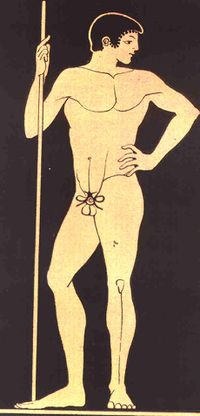Difference between revisions of "Kynodesme"
WikiModEn2 (talk | contribs) (Wikify.) |
WikiModEn2 (talk | contribs) (Wikify.) |
||
| (One intermediate revision by the same user not shown) | |||
| Line 1: | Line 1: | ||
[[File:Kynodesme.jpg|200px|thumb|right|Greek athlete wearing a kynodesme.]] | [[File:Kynodesme.jpg|200px|thumb|right|Greek athlete wearing a kynodesme.]] | ||
| − | In ancient Greece, the '''kynodesme''' (κυνοδεσμη, lit. "dog leash") was a thin leather strap that was wound around the [[acroposthion]] (AKA the part of the foreskin which hangs past the head of the penis), which pulled the penis upward and was tied in a bow, tied around the waist, or secured by some other means.<ref name="Hodges">{{REFjournal | + | In ancient Greece, the '''kynodesme''' (κυνοδεσμη, lit. "dog leash") was a thin leather strap that was wound around the [[acroposthion]] (AKA the part of the [[foreskin]] which hangs past the head of the penis), which pulled the [[penis]] upward and was tied in a bow, tied around the waist, or secured by some other means.<ref name="Hodges">{{REFjournal |
|last=Hodges | |last=Hodges | ||
|init=FM | |init=FM | ||
| Line 21: | Line 21: | ||
Public exposure of the glans was considered unsightly and indecent, as an exposed [[glans]] was associated with intimate circumstance of having an [[erection]].<ref name="Hodges"/> Furthermore, an exposed glans resembled the permanently externalized glans of the circumcised penis, where the removal of the foreskin was considered akin to castration.<ref name="Hodges"/> | Public exposure of the glans was considered unsightly and indecent, as an exposed [[glans]] was associated with intimate circumstance of having an [[erection]].<ref name="Hodges"/> Furthermore, an exposed glans resembled the permanently externalized glans of the circumcised penis, where the removal of the foreskin was considered akin to castration.<ref name="Hodges"/> | ||
| − | The Greeks used term psolos (ψωλος, lit. "having an [[erection]]") to describe a man with an exposed [[glans]].<ref name="Hodges"/> The term was not exclusive to a man who was [[circumcised]], but could apply to any man with an exposed glans, either actually having an [[erection]], or a man who was afflicted with [[lipodermos]].<ref>{{REFbook | + | The Greeks used term psolos (ψωλος, lit. "having an [[erection]]") to describe a man with an exposed [[glans]].<ref name="Hodges"/> The term was not exclusive to a man who was [[circumcised]], but could apply to any man with an exposed [[glans]], either actually having an [[erection]], or a man who was afflicted with [[lipodermos]].<ref>{{REFbook |
|editor=Ada Adler | |editor=Ada Adler | ||
|title=Suidae Lexicon: Lexicographie Graeci | |title=Suidae Lexicon: Lexicographie Graeci | ||
| Line 37: | Line 37: | ||
{{REF}} | {{REF}} | ||
| + | [[Category:History]] | ||
[[Category:Physiology]] | [[Category:Physiology]] | ||
| + | [[Category:Male sexuality]] | ||
[[Category:From Intactipedia]] | [[Category:From Intactipedia]] | ||
Latest revision as of 22:38, 17 December 2023
In ancient Greece, the kynodesme (κυνοδεσμη, lit. "dog leash") was a thin leather strap that was wound around the acroposthion (AKA the part of the foreskin which hangs past the head of the penis), which pulled the penis upward and was tied in a bow, tied around the waist, or secured by some other means.[1] Vase paintings and statues frequently portray nude athletes and komasts wearing the kynodesme.
Public exposure of the glans was considered unsightly and indecent, as an exposed glans was associated with intimate circumstance of having an erection.[1] Furthermore, an exposed glans resembled the permanently externalized glans of the circumcised penis, where the removal of the foreskin was considered akin to castration.[1]
The Greeks used term psolos (ψωλος, lit. "having an erection") to describe a man with an exposed glans.[1] The term was not exclusive to a man who was circumcised, but could apply to any man with an exposed glans, either actually having an erection, or a man who was afflicted with lipodermos.[2]
The kynodesme, then, was used in ancient Greek society as a means to prevent the public indecency of an exposed glans when nude.[1]
References
- ↑ a b c d e
 Hodges FM. The Ideal Prepuce in Ancient Greece and Rome: Male Genital Aesthetics and Their Relation to Lipodermos, Circumcision, Foreskin Restoration, and the Kynodesme. Bull. Hist. Med.. September 2001; 75(3): 375-405. PMID. Retrieved 1 November 2019.
Hodges FM. The Ideal Prepuce in Ancient Greece and Rome: Male Genital Aesthetics and Their Relation to Lipodermos, Circumcision, Foreskin Restoration, and the Kynodesme. Bull. Hist. Med.. September 2001; 75(3): 375-405. PMID. Retrieved 1 November 2019.
- ↑
 (1935) Suidae Lexicon: Lexicographie Graeci. Ada Adler (ed.). Vol. 1. Leipzig: Teubner. Pp. 4:849.
(1935) Suidae Lexicon: Lexicographie Graeci. Ada Adler (ed.). Vol. 1. Leipzig: Teubner. Pp. 4:849.
